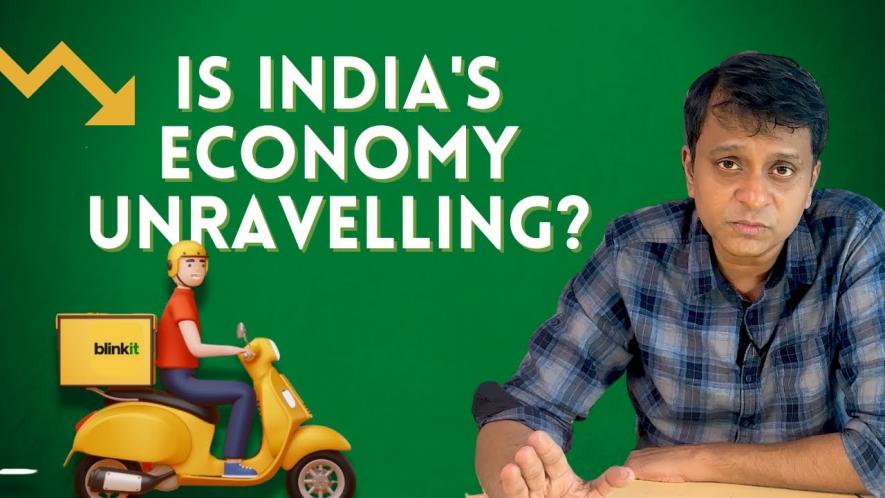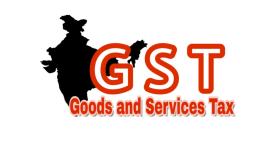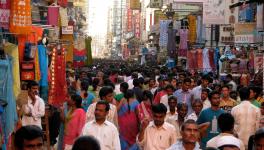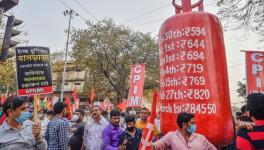Is India’s Economy Beginning to Unravel?

Three things happened in the world of technology in the past few days. Apple opened its first store in India. Blinkit had to temporarily shut shop in several parts of Delhi NCR (national capital region) as its riders went on strike. And Infosys, the poster boy of India's IT revolution, took a hammering at the stock markets after it announced that its profits are likely to slow down this year.
Now these seem like three unconnected events, right?
But together, they tell us a story about India's economy, especially what matters to white-collar middle-class households.
Let us begin with Apple. You must have seen the videos of Tim Cook opening the first company owned store in Mumbai's Bandra Kurla complex. Now, Apple had made it a mega event and if they wanted free publicity for it, India's media obliged.
Apple has seen huge growth in India over the past couple of years. iPhone 13 was the largest selling premium smartphone in India in 2022. And Apple's total revenues in India were about Rs 33,500 crore in 2021-22. That would have grown even more in the last fiscal. I don't have the data for it right now.
Compare that to HUL or Hindustan Unilever, which is India's largest FMCG company. For those of you who don't know what FMCG stands for, it is fast-moving consumer goods, like soaps, toothpaste, shampoo, hair oil, biscuits, packaged foods etc.
HUL's total sales in 2021-22 were about Rs 51,000 crore. This is a company that claims that nine out of 10 households in India use its products. Compare that with Apple, less than 4% of Indians use iOS devices, which includes iPhones, iPads and all other Apple products.
This is understandable, HUL produces very cheap things and often targets the low-end customer with small packages, like sachets of shampoo. Apple, on the other hand, prices its products above all other brands. Owning an Apple product has significant snob value, not only in India but everywhere else in the world. Yet, Apple is already selling two-thirds as much in terms of monetary value as HUL in India. One reaches less than 4% of families, the other reaches 90% of households in India.
This gives you a direct comparison of how income, wealth and purchasing power is distributed in this country. And that brings us to Blinkit.
Those of you who have used the app know how brilliant it is. Blinkit literally delivers groceries to my doorstep faster than it takes me to walk down from my apartment to the store inside our society premises.
How does it do it? It only keeps a limited number of everyday items and whereas it's close to you, the countdown begins as soon as you've paid and then the items you ordered are packed very quickly while the riders wait outside to rush to your home with the offer. They're super-fast and because of their efficiency, Blinkit started out by paying them Rs 50 per order. That's what reports say.
Now, customers don't pay for this. Normally, not only do you get big discounts on whatever you buy, once your order size crosses a certain threshold, delivery becomes free. But who bears the cost?
Till now, Blinkit has been doing it. Reports say that Blinkit sold products worth some Rs 300 crore but it also lost almost as much money to acquire and then hold on to customers like me. This is all great, as long as funds were flowing in, including from Blinkit's parent company, Zomato.
But now there's a funding winter in the tech start-up space and Blinkit, too, has to cut costs. So, it first reduced rider fees to Rs 25 from Rs 50, and now reports say this has been brought down to just Rs 15 per delivery. From Rs 50 to Rs 15, if the reports are correct!
So, riders across Delhi NCR have gone on strike, and that is why Blinkit has not been operating in many places. At least till the time of recording this.
This is another snapshot of the reality of our economy. India's start-up boom only works when it doesn't have to make profits. As soon as it tries to make profits by cutting costs or charging customers, the business model becomes to unravel.
This tells us that there is simply not enough demand in our economy, even amongst the middle class, to sustain consumption growth at currently prevailing prices. This also tells us that middle class consumption over the past three years has been significantly boosted through freebies. Not from the government but from finance capital investing in start-ups.
And that brings me to Infosys. The COVID years have come as a boon for Indian IT. Everyone and everything went online and companies like Infosys and TCS got a lot of additional business to provide IT solutions and to run back-offices for tech companies. This rise in demand made IT majors, like Infosys, rush to increase their bench strength. They also had to pay more because tech start-ups were picking up all the talent in the market at fabulous salaries.
But then COVID ended. People went back offline and demand fell. On top of that, big capitalist economies began to falter. That was a double whammy. Now Infosys has declared, what is known as a ‘soft guidance, for this fiscal year. Its growth projections are lower than what the market wants and what its share price justifies. So, the stock crashed in just a few sessions and since then several big brokerages have downgraded the company's shares.
This, too, has far-reaching consequences for India's middle class, especially the young, many of whom have spent years and a lot of their parents' money to become IT engineers. The job market for them has suddenly dried up, not just in the start-up space but now also in the established IT services space.
This is bad news, because it will drive down salaries and wages across the board. And that, in turn, will have an impact on overall demand in the economy, which again will make it difficult for the Blinkits of the world to sell its goods, and for Apple to sell its iPhones. That's how these seemingly disparate things are all connected.
Everything is connected in the economy. You just can't escape it.
Aunindyo Chakravarty was Senior Managing Editor of NDTV India & NDTV Profit. He runs the YouTube channel Desi Democracy and anchors a bi-weekly show on Newsclick. The views are personal.
Get the latest reports & analysis with people's perspective on Protests, movements & deep analytical videos, discussions of the current affairs in your Telegram app. Subscribe to NewsClick's Telegram channel & get Real-Time updates on stories, as they get published on our website.
























